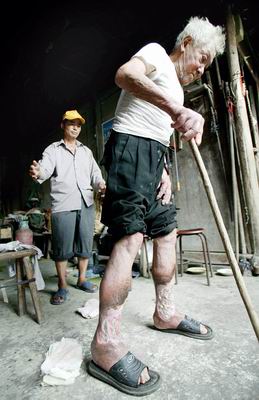
Jiang Hongcai, 81, limps around on his festering legs at
his home in Yiwu, Zhejiang Province. He is one of more than 200 survivors of the
germ warfare Japanese troops staged in villages along railways in Zhejiang and
Jiangxi Province during WWII. ¡ª Xinhua
Japan's invasion 60 years ago retarded China's social development by half a
century, causing Chinese people great pains that they can never forget, a
history researcher said yesterday.
Dr Bian Xiuyue, researcher on modern
history with the Chinese Academy of Social Sciences, said Japan's invasion
during 1931-1945 wreaked havoc on the Chinese people, causing great casualties,
economic and cultural losses and "retarded China's social modernization process
by as long as 50 years."
From 1937 to 1945 alone, when the Chinese waged the
war against Japanese invasion, the Japanese army killed tens of millions of
Chinese in more than 4,000 slaughters. "Japanese atrocities happened on almost
two-thirds of Chinese territory and covered most of the 14 years from the time
Japan started the war to its defeat," Bian said.
Most parts of China, except
Tibet and Xinjiang, were directly under the Japanese and were constantly
bombarded by their warplanes, he said, adding that research shows the war
brought about US$100 billion in direct and US$500 billion in indirect economic
losses to China.
"I can say without any exaggeration that China was hurt most
in the world's Anti-Fascist War. No other country suffered such heavy losses and
paid such a high price for the war."
Elsewhere, the memorial hall to
commemorate the war of resistance against Japanese invasion, which opened 17
years ago and is located in Beijing's southwestern suburbs, has seen nearly 10
million visitors, who have left their remarks and commentary in piles of
books.
Sixty years after World War II, the painful memories of the Japanese
invasion still rankle Chinese people, even as they hope to pursue peace.
Wang
Xinhua, curator of the memorial hall, was proud that an exhibition to
commemorate the 60th anniversary of the victory of the Chinese people's
anti-Japanese war is now being staged in the hall, which is the most
comprehensive exhibition in the country. Divided into eight parts, the
exhibition brings forth the united efforts by the military and civilians and
showcases sabers, medals, trophies, heroic stories and valiant words.
"I feel
so shameful that I could not die in fighting against the Japanese invasion."
This poetry, which has moved hundreds of visitors, was written by a famous
anti-Japanese hero Ji Hongchang, several minutes before his death 60 years
ago.
"Remember history and never forget the past, with cherishing attitude
toward peace and exploring future." These words by President Hu Jintao are the
best footnote to the main theme of the last part of the exhibition-taking
history as the mirror and facing the future.
"After visiting the memorial
hall, I feel that we Chinese should never forget the shame we experienced and
unite together to build a great country," said Li Siyang, a Beijing
student.



